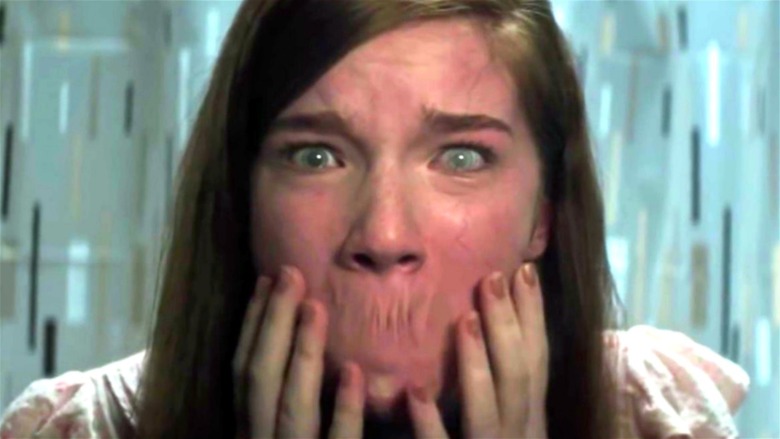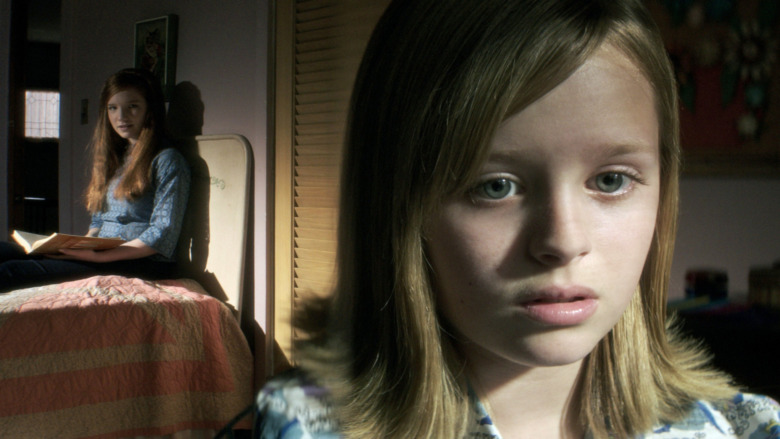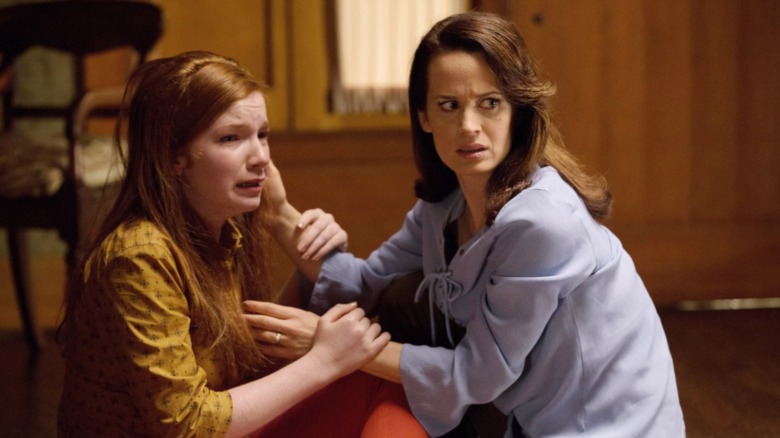The Ending Of Ouija: Origin Of Evil Explained
If there's one genre that garners more sequels than you'd expect (that doesn't include the words "fast" and/or "furious" in the title), it's horror. "Friday the 13th," "A Nightmare on Elm Street," "Halloween," and a nigh-uncountable number of others have all generated multiple sequels.
However, when you look back over a horror franchise, the common wisdom is that the first movie is usually the best. However, we've started to see that horror franchises can improve, even exponentially, with time. There are three "Annabelle" films, for example, and the first one is by far the worst-received critically. And the same can be said for the "Ouija" movies.
The Michael Bay-produced original 2014 "Ouija" rests at a critical failure of 6% on Rotten Tomatoes. The 2016 prequel "Ouija: Origin of Evil," by contrast, has a stunning 82% fresh rating. The difference in reception is staggering, and, while we could chalk a lot of that up to the involvement of "The Haunting of Hill House" showrunner Mike Flanagan (he both co-wrote and directed "Ouija: Origin of Evil"), a big part of what makes "Origin of Evil" successful is that it sticks its landing.
Let's talk about what the ending of "Ouija: Origin of Evil" is really about.
Ghosts represent grief in Ouija: Origin of Evil
To understand the ending of "Ouija: Origin of Evil," you have to consider where its story begins.
It's 1967 in Los Angeles, and Alice Zander (Elizabeth Reaser) is struggling to cope with the death of her husband Roger (Michael Weaver) both emotionally and financially. In order to support her daughters Lina (Annalise Basso) and Doris (Lulu Wilson), Alice utilizes a fake psychic business. For the three women, the justification for lying to people seeking to commune with the deceased is simple: If it makes them feel better, then the lie is one of care and not harm.
While it's certainly possible to argue that the Zanders' marks are helped, the simple reality is that there is real harm being done to the Zanders themselves. This harm is translated through a horror lens by Alice incorporating a Ouija board into her psychic act at the behest of Lina.
The Ouija board literally causes Doris to psychically commune with a tortured spirit named Marcus (Doug Jones). Throughout "Ouija: Origin of Evil," we discover more about Marcus: He was a Polish immigrant, he was captured by an evil doctor and experimented on in the Zanders' basement before they lived there, and his spirit has been watching the house ever since.
This is not a movie about literal ghosts, though, but figurative ones. Doris' pain isn't being helped by living in a house dedicated to pretending the dead can be spoken with. Her psychic ability represents an unhealthy desire to take back what she's lost — her father. Doris' efforts to find peace through fictionalizing her own life only lead her to discover other hidden traumas within her own home and then take those on as well. The end of "Ouija: Origin of Evil" is about the consequences of Doris' (and the two other Zander women's) untreated grief.
An indictment of mental health care
Doris gets possessed, and the only way for Lina to resolve that possession is by literally sewing Doris' mouth shut — and in doing so, Lina kills Doris. Lina then gets possessed herself and winds up killing her mother Alice.
The visual horror is harrowing, but it's not as harrowing by half as what all of this represents. Lina tries to silence Doris, and the forced silence leads to death. There are deeply traumatizing consequences to trying to silence someone's grief, especially a child's.
Doris has no idea how to cope with the pain she feels at losing her father, so she tries to engage with it through supernatural means. In doing so, Doris also tries to get Lina and Alice to engage with that same pain, and their inability to cope together tears the family apart.
The end of "Ouija: Origin of Evil" sees Lina in a mental institution, where her trauma is ignored to the point that she builds a new Ouija board on the floor with her own blood. The ending is a real indictment of a systemic lack of care for anyone dealing with profound emotional trauma or mental illness.
Yes, the post-credits sequence connects Lina and her experiences with the events of the first "Ouija" movie, but that's not what the ending is really about — "Ouija: Origin of Evil" is about how cycles of grief continue until we collectively work together to stop them.


